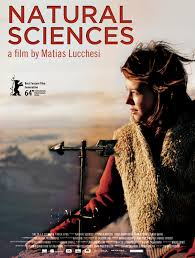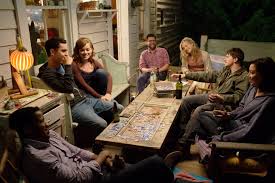 I like all sorts of films. And amongst those films that I like, I hold a special place for those that are interested in depicting the decency of its characters. Most stories pit the protagonist against a person who means him harm, but in my opinion those are lesser stories, lazier stories that take the easy way out. The more accomplished ones, the more human ones, are those in which all of the characters are inherently decent. Filmmakers who refuse to create villains, but instead watch generally well-meaning individuals crash and bump into each other’s orbits by virtue of who they are, come the closest to approximating life on the cinema screen. Because no one in real life is all-out evil; there are few bonafide villains in most people’s lives. And it takes a giftedly perceptive writer to be empathetic to every character on the pages of his script. Ozu’s films are watched by film-lovers more than half a century after they were made for this reason alone. In contemporary cinema, Asghar Farhadi, the director of A SEPARATION and THE PAST is able to pull this off. And the lovely, remarkable films by Hirokazu Kore-Eda, the heir to Ozu, are case examples of how to do this right. Kore-Eda’s latest movie, LIKE FATHER LIKE SON is my favorite film of the year for its impossibly clear-headed commitment to seeing the inherent decency in its assembly of characters The new film LOVE IS STRANGE joins that rarefied cadre of films.
I like all sorts of films. And amongst those films that I like, I hold a special place for those that are interested in depicting the decency of its characters. Most stories pit the protagonist against a person who means him harm, but in my opinion those are lesser stories, lazier stories that take the easy way out. The more accomplished ones, the more human ones, are those in which all of the characters are inherently decent. Filmmakers who refuse to create villains, but instead watch generally well-meaning individuals crash and bump into each other’s orbits by virtue of who they are, come the closest to approximating life on the cinema screen. Because no one in real life is all-out evil; there are few bonafide villains in most people’s lives. And it takes a giftedly perceptive writer to be empathetic to every character on the pages of his script. Ozu’s films are watched by film-lovers more than half a century after they were made for this reason alone. In contemporary cinema, Asghar Farhadi, the director of A SEPARATION and THE PAST is able to pull this off. And the lovely, remarkable films by Hirokazu Kore-Eda, the heir to Ozu, are case examples of how to do this right. Kore-Eda’s latest movie, LIKE FATHER LIKE SON is my favorite film of the year for its impossibly clear-headed commitment to seeing the inherent decency in its assembly of characters The new film LOVE IS STRANGE joins that rarefied cadre of films.
My favorite moment in LOVE IS STRANGE comes at about the halfway point when the two sixty-plus year old leads of the film are squeezed into the bottom half of a teenager’s bunk-bed. George and Ben (John Lithgow and Alfred Molina), together for almost four decades, have been recently forced to seek roof in separate homes. On that bunk-bed, they are finally together after a long time, and Ben says “After thirty nine years together, I am used to the presence of your body next to me in bed. These new living arrangements are putting a serious damper on my sleep patterns”. He says it only half jokingly.
And it is a rare moment of self-pity (no matter how aching) in a film that is not particularly interested in wallowing, or in yelling what it wants to say.
As the film opens, it catches George and Ben getting married in the presence of a small group of family and friends who gather in their New York City apartment to celebrate after the ceremony. Like the elderly couple at the center of AMOUR, you can tell that the decades George and Ben have spent together has brought them to a place of unquestionable burnished commitment. They are used to each other and understand each other and know each other. Lithgow and Molina, taking their cues from a gentle, keenly observant script rise to the challenge of this film with remarkable dexterity; you will not find a scene in this film where they are unconvincing. History has finally allowed George and Ben to legally cement their relationship; one can sense that these two have waited their entire lives for this privilege. But this simple act of commitment snowballs into much undoing. George who teaches music at a Catholic school is told that he can no longer keep his job. The mortgage to their apartment no longer affordable, George and Ben have no option but to sell their home, and move out, if only temporarily, until they find another place they can rent in the city. After living together so long the two are suddenly, in effect, homeless. And you realize that this is the space the film has wanted to explore all along.
What are their family and friends, as well meaning as they might be, to do to help them? This being New York City, nobody has room to spare for two guests. Ben goes to live at the home of his nephew, his wife and young son (Dan Burrows, Marisa Tomei and Charlie Tahan). Ben is offered temporary housing at the home of friends who are cops (Cheyenne Jackson and Manny Perez). With the best of intentions, the presence of a house guest in an already cramped home space is bound to create tensions. Tomei’s character, a stay at home writer, tries her best to concentrate on her work while Ben is eager to talk to her all day. She is patient, and perceptive, but slowly the strains begin to show. The teenaged son Joey, already upset at having to give up his (bunk) bed and room to uncle Ben is further unsettled by the his best friend’s apparent friendship with his uncle.
George soon realizes that the home of his friends is one that is constantly committed to entertaining others. There is loud music and singing and coming and going of many, and literally no place for George to hide.
Being separated from each other after decades of co-habitation is one thing, but finding a physical state of stability in their respective new residential arrangements is even more elusive. In many way the condition of Ben and George evokes that of the older parents from TOKYO STORY, who realize that their presence in the lives of their grown children has a intrusive effect, and show strive to respectfully step away.
This could have been a film about the First World problems of the privileged. But with its shrewd script, completely underplayed tone, LOVE IS STRANGE (just as LIKE FATHER LIKE SON) provides a definition of family that is vital. Not just for Ben and George but for all those around them. It is the only definition that matters. As Roger Ebert liked to say, no matter when it opens, this movie will be the best film playing in town.







